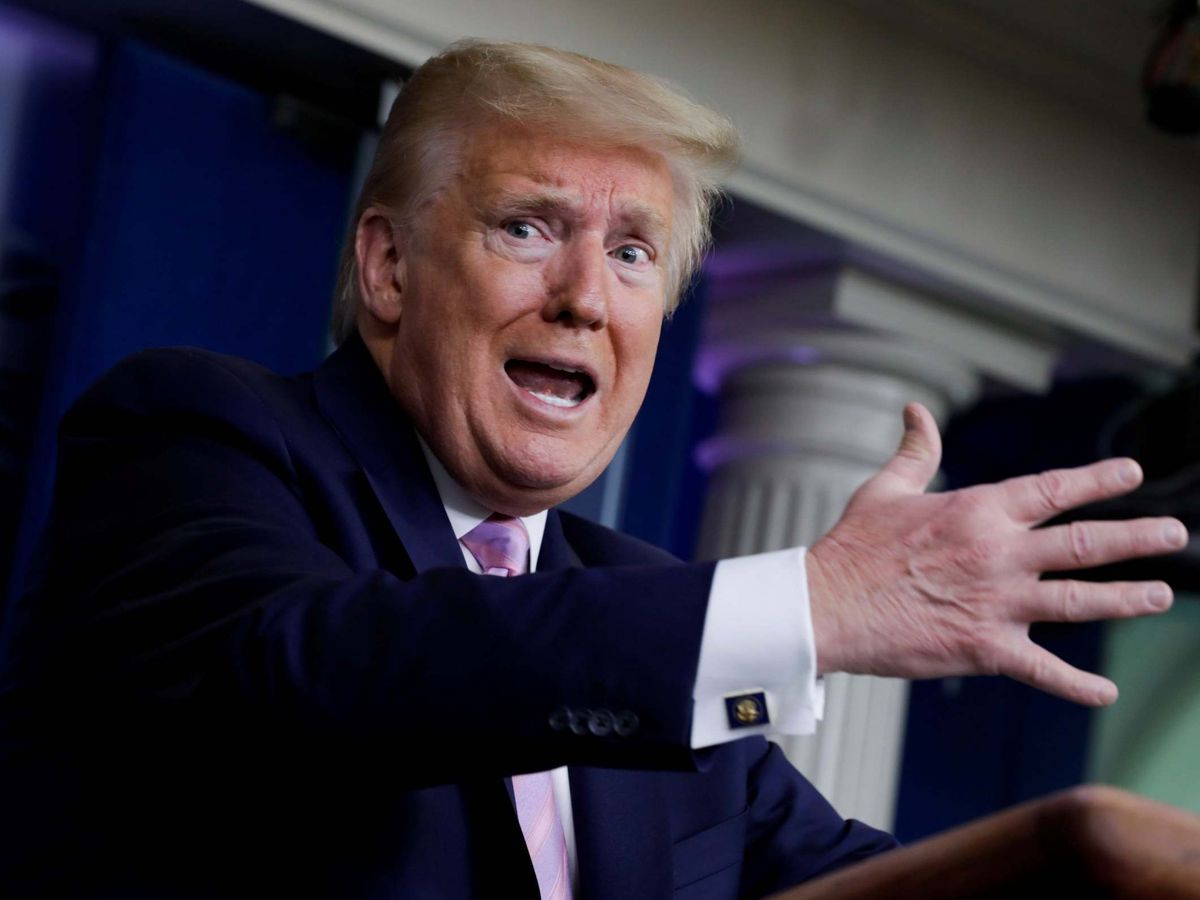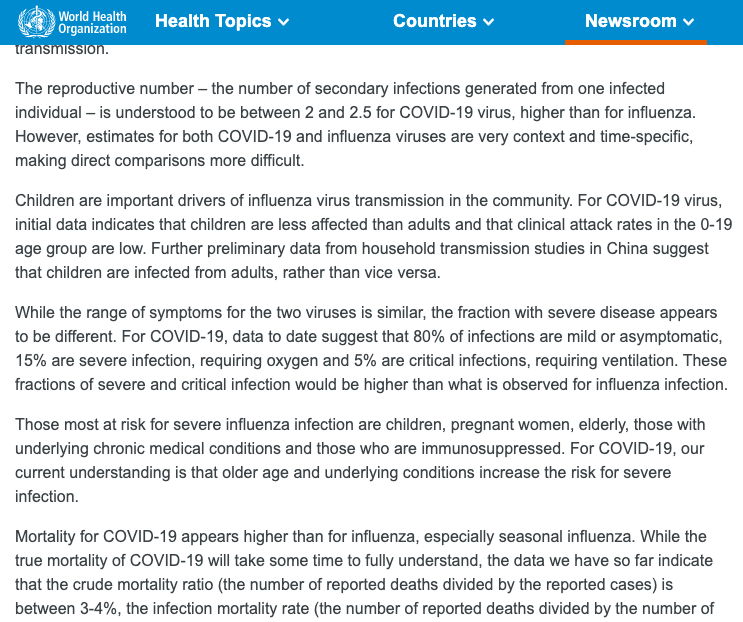Republicans push back against criticism of Trump over COVID-19

A few minutes every morning is all you need.
Stay up to date on the world's Headlines and Human Stories. It's fun, it's factual, it's fluff-free.
According to official numbers, the United States has by far the highest number of coronavirus cases of any country in the world, as well as the most deaths attributed to the virus.
As of April 30, the US has recorded over 1 million cases and more than 63,500 deaths due to the outbreak.
US President Donald Trump has received considerable criticism for his administration’s handling of the crisis. According to the Pew Research Center, a nonpartisan research institution, while voters that lean Republican are more likely to support the president’s handling of the virus, 65% of Americans overall say Trump’s response to the outbreak has been too slow.
That said, there are still major partisan disagreements on Trump’s overall response. A majority of Republicans (52%) say it is unacceptable for elected officials to criticize Trump’s handling of the virus, while only 14% of Democrats agree.
75% of voters who lean Republican say that Trump is providing the public with accurate information regarding COVID-19, while only 13% of voters who lean Democrat agree. Similarly, 78% of Republicans believe Trump has done a good job handling the economic fallout over the virus, compared to 18% of Democrats.
Most Americans agree with social distancing and quarantine efforts no matter their political affiliation. While some Republicans have publicly criticized the president’s handling of the virus, others feel he has done a good job.
What kind of arguments are Republicans making in Trump’s favor?
US population
Baron Christopher Hanson, the owner of RedBaronUSA, an American consulting firm, spoke with The Millennial Source to argue that “foolish liberal travel policies” coupled with the sheer size of the population meant that the US was more susceptible to a viral outbreak.
“The Italian population of 60 million compared to America’s 330 million is wildly disproportionate,” Hanson argued. “The Trump administration is not to blame for how massive the USA scope, scale and population is – which if you do the math, America has fared far better.”
According to the rate of per capita deaths, i.e. the number of people affected in relation to the overall population, Italy has fared worse than the US.

Despite the US having over twice as many deaths as the worst hit countries in Europe, Spain and Italy, those countries’ death rates per 1 million people are actually higher. Italy has seen 458 deaths per million, while Spain has seen 519. At the time of writing, the US death rate per million is 186.
It is clear, however, that other countries with much larger populations that the US have done a better job at controlling the spread.
China and India, the two most populous nations on earth, have thus far limited the number of cases to 83,000 and 35,000 people. This despite both countries having populations of well over a billion people.
Other countries, like Vietnam, have implemented stringent tracing and public mobilization efforts to limit their total number of cases. Vietnam has recorded fewer than 300 cases and zero deaths.
US culture and systems
Another conservative, Andrew Shecktor, a 2016 delegate to the Republican National Convention and 2018 candidate for the US House of Representatives from Pennsylvania, told The Millennial Source that shutting down the country and implementing strict protocols would always be difficult in the US.
“As a free nation, based on capitalist values it is an extremely difficult decision to shut down the entire nation and permanently destroy the livelihood of its citizens. It was not until it was realized that the speed of transmission was much greater than other coronaviruses or the seasonal flu that it was decided to shut down the nation to stop the spread,” he said.
According to a timeline of events published by the World Health Organization (WHO), on January 22-23, WHO leaders convened an emergency meeting to assess the severity of the outbreak. Official statements say that global experts could not reach a consensus based on the evidence available at the time on “whether the outbreak constituted a public health emergency of international concern.”
Nevertheless, experts and the WHO leadership explicitly recommended that countries “should be prepared for containment, including active surveillance, early detection, isolation and case management, contact tracing and prevention of onward spread of [COVID-19].”
The WHO officially characterized the virus as a global pandemic on March 11. Trump declared a national emergency in the US on March 13.
Incomplete information?
According to Jonathan Runstadler, a professor in the Department of Infectious Diseases and Global Health at Tufts University, there were still many unknowns about COVID-19 at this time.
“We don’t know enough about the virus itself or how it spreads. The confirmed cases are slowly climbing in the U.S., and they seem to be pretty widely distributed. But they still represent a fairly low number on the scale of this epidemic.” Runstadler argued In an article published on March 12, adding, “This new coronavirus seems to cause similar symptoms and to progress in a similar way to flu.”

Despite the uncertainty surrounding the virus, Runstadler criticized the US for being unprepared for a large-scale outbreak. “The U.S. seems to be behind in terms of available tests, protective equipment and other readiness measures,” he said.
On March 17, the WHO said that there was still a lot to learn about the specifics regarding COVID-19 transmission. “Mortality for COVID-19 appears higher than for influenza, especially seasonal influenza,” they wrote.
“While the true mortality of COVID-19 will take some time to fully understand, the data we have so far indicate that the crude mortality ratio (the number of reported deaths divided by the number of infections) is between 3-4% [for COVID-19]. For seasonal influenza, mortality is usually well below 0.1%. However, mortality is to a large extent determined by access to and quality of health care,” added the WHO.
“Trump is Trump”

When asked whether Trump deserves some criticism for his handling of the virus, especially in light of those who say he has continued to stoke American divisions during a time of crisis, Shecktor said that he “would argue that Trump is Trump. Always has been, always will be.”
Although he said he supports the President’s handling of the virus, there was one issue where he thought he could have done better. “As for Trump and any medications, I feel the president of a nation should not be making any recommendations; it is a recipe for disaster. Those recommendations should be made by health professionals and those organizations such as the CDC which were created to deal with these matters.”
“It is his lack of political experience as well as having been a business leader that I attribute this to,” Shecktor concluded.
[article_ad]
Have a tip or story? Get in touch with our reporters here!
Sign up for daily news briefs from The Millennial Source here!




Comments ()